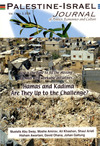After the war in Lebanon and the continued launching of Qassam rockets from Gaza into Israel, the general consensus in Israel today is that the idea of a further unilateral disengagement in the West Bank is dead. All public opinion polls indicate that the overwhelming majority of the Israeli public, both on the left and on the right, believe that unilateralism is a recipe for further violence. This leaves only two options. The first is paralysis, to do nothing, which will guarantee another round of violence in the near future. And the second, more preferable option is negotiation, which will lead to a resumption of a realistic peace process.
At the Palestine-Israel Journal, we have always believed that a resolution of the Israeli-Palestinian conflict, based upon a two-state solution, is the key to a good and secure life for both Israelis and Palestinians. It is also a key to regional security and stability.
This issue explores the complex post-election and post-war reality in both the Israeli and Palestinian societies.
Kadima was created to implement a unilateral withdrawal from the West Bank to follow the disengagement from Gaza. Today it is clear that Kadima has lost its unilateral agenda, and Hamas, which was unprepared to assume the reins of national responsibility, didn't have a clear national agenda. Today, the Israeli government is looking for a new agenda, while the Palestinians are exploring the possibility of a national unity government based upon the principles of the National Reconciliation Document (the "Prisoners' Document").
Since regional and international relations do not tolerate a vacuum, now is the time to fill the missing agendas with workable initiatives. If the Kadima and Hamas leaderships are not up to this task, they will lose their moment in history and will soon disappear from the scene.
The articles and the roundtable in this issue explore the delicate, problematic situation that exists in both societies, which clearly creates obstacles to progress. Now is the time to fill the missing agendas with workable initiatives. These include NGO initiatives, Track 2 initiatives, and internationally brokered initiatives - anything and everything that can lead to concrete talks between governments.
The Arab Peace Initiative of 2002, which calls for a resolution of the Israeli-Palestinian conflict based upon a two-state solution to be followed by a normalization of relations between Israel and the entire Arab world, can definitely be one of the keys to progress. A resumption of talks between the Israeli and Syrian governments is also a key component in the quest for comprehensive peace and regional stability.
If Israelis, Palestinians and the regional and international players are incapable of responding to the window of opportunity created by the post-war situation, we will all be doomed to another round of unnecessary bloodshed and instability.

